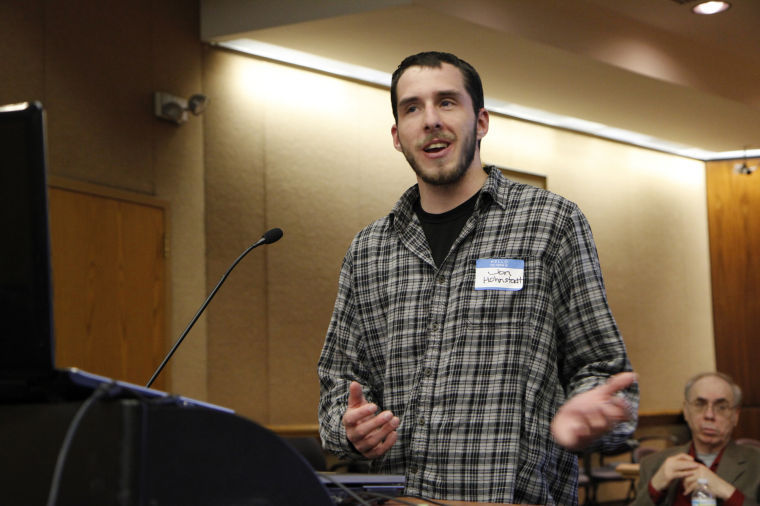Panel discussion focuses on military drones
Senior sociology major, John Hohnstadt, U.S. Army veteran who served tours in Iraq and Afghanistan, speaks at the “International, Human Rights & Moral Concerns over the use of drones” event on Monday night in Rm. 190 of Swen Parson Hall. Hohnstadt gave his perspective on the use of drones, and believes them to be a tool that saves soldiers’ lives.
March 19, 2013
As drones make headlines across the groups, groups informed the community about the pros and cons of using drones in combat Monday night, as drones make headlines across the globe.
The panel of speakers was made up of professors from various universities, a published poet and a veteran who attends NIU. Howard Solomon of the City Colleges of Chicago Center for Distance Learning, was the first to speak and chose to use a utilitarian argument.
“From a technological standpoint, drones have a lot of promise,” Solomon said. “Drones give you a lot of control up until the last second.”
Drones are unmanned aerial vehicles (UAVS) that have weaponry but no pilot on board. Solomon firmly opposes the use of drones.
“Even with the collateral damage done, we would still be better off without the drones,” Solomon said. Solomon mentioned an 2009 speech by President Barack Obama in which the president said it only takes a small group of wrong-minded people to take technology to places it doesn’t need to go and cause a lot of damage.
Dr. Joy First of the Wisconsin Coalition to Ground the Drones and End the Wars said she believes the president and drones are at fault for another type of damage: deaths.
“Obama ordered his first drone strike on his second day in office,” First said. “I believe that day he became a war criminal.”
First said that drones have killed around 196 children in Pakistan.
“Only 2 percent of those killed are actually high-level targets,” First said. “I believe we all have blood on our hands.”
Jon Hohnstadt, a senior sociology major at NIU and a U.S. veteran, spoke for both sides of the argument.
“I know that I personally benefited from the drones,” Hohnstadt said.
Hohnstadt said using updated technology is not a new thing.
“We were the first to realize we could use cartridges,” Hohnstadt said. “It makes war more efficient, in the mundane sense of the word.”
Hohnstadt said the fact that rifles are used by the military is even a technology upgrade.
“In war there’s always casualties,” Hohnstadt said. “There is not one war you can find that you don’t have casualties.”
All of the speakers touched on the lack of accessibility to numbers on casualties caused by the war.
Associate professor Morse Tan from the NIU College of Law spoke mainly about international law and the effects it may have on the users.
“Is there something about drones that is analogous to the types of weapons already prohibited by international law?” Tan said.
Tan also wondered aloud if the Constitution applies to U.S. citizens killed by the drones. Another concern brought up by Tan was whether the “PlayStation effect” would come into play.
“This is like a video game for the person controlling the drone,” Tan said. “It has a dehumanizing effect.”
Another concern brought up by every speaker was the way civilians and militants are distinguished.
“Any male between the ages of 16 to 65 are considered militants,” First said.
Poet Ric Amesquita recited a poem he wrote immediately following the Sandy Hook shooting. The poem included lines such as “war became our mantra,” and “In God and drones we trust, no matter who dies, isn’t that right, commander in chief?” In the poem, Amesquita mentioned the shootings at NIU, Columbine and Virginia Tech. The poem asked the question of what the new pledge of allegiance would be, using examples of songs such as “Another One Bites the Dust” and “It’s the End of the World as We Know It.”







